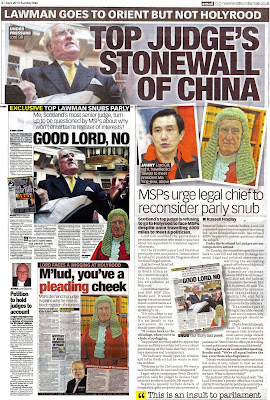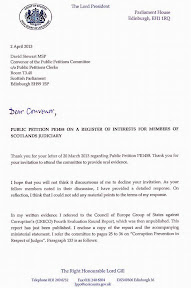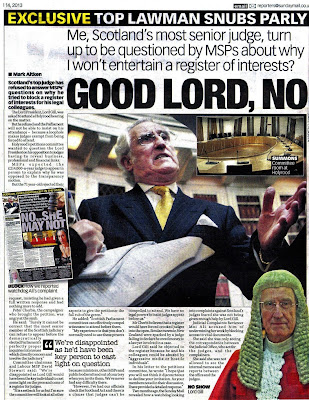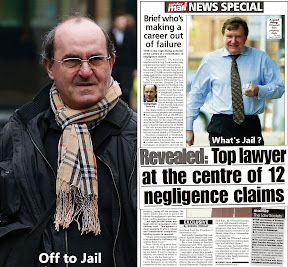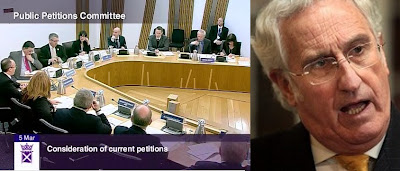 Top judge Lord Gill has so far refused to answer questions on judicial secret interests. AS reported by Diary of Injustice earlier this week, MSPs from the Scottish Parliament’s Public Petitions Committee have once again invited Scotland’s top judge, the Lord President Lord Brian Gill to attend Holyrood to explain his ‘robust’ opposition to a proposal put forward in Petition PE1458 which calls for a Register of Judicial Interests for all members of Scotland's judiciary.
Top judge Lord Gill has so far refused to answer questions on judicial secret interests. AS reported by Diary of Injustice earlier this week, MSPs from the Scottish Parliament’s Public Petitions Committee have once again invited Scotland’s top judge, the Lord President Lord Brian Gill to attend Holyrood to explain his ‘robust’ opposition to a proposal put forward in Petition PE1458 which calls for a Register of Judicial Interests for all members of Scotland's judiciary.
This second invitation from the Scottish Parliament to Scotland’s most senior judge comes after the Lord President Lord Gill earlier refused to attend the Petitions Committee to discuss issues raised in Petition PE1458, reported here : Scotland’s top judge Lord Gill refuses to attend Scottish Parliament to face questions over opposition to register of judicial interests
Petition PE1458: Register of Interests for members of Scotland's judiciary which was debated again at the Public Petitions Committee on Tuesday 16 April 2013, calls for the Scottish Parliament to urge the Scottish Government to create a Register of Pecuniary Interests of Judges Bill (as is currently being considered in New Zealand's Parliament) or to amend present legislation to require all members of the Judiciary in Scotland to submit their interests & hospitality received to a publicly available Register of Interests.
The full Official Report of last week’s Petitions Committee meeting where Petition PE1458 was discussed, has now been published, available online HERE, and is reprinted below, along with a link to video footage of the PPC meeting for readers convenience.
All previous reports from Diary of Injustice and further information on the drive to create a register of interests for Scotland’s judiciary can be viewed here : A Register of Interests for Scotland's Judiciary
Petition 1458 Register of Interests for Scotland's Judiciary Scottish Parliament 16 April 2013 (click image below to watch video footage of Petitions Committee debate)
Judiciary (Register of Interests) (PE1458)
The Convener David Stewart MSP: The eighth current petition is PE1458, by Peter Cherbi, on a register of interests for members of Scotland’s judiciary. Members have a note by the clerk and the submissions. Members will be aware that there has been a lot of press coverage of the issue and that Lord Gill, the Lord President, declined the invitation to appear before the committee. As members will know, under the Scotland Act 1998 we have no power to cite judges to appear before us.
We received a courteous letter from Lord Gill, but it is important for us to get key figures in the judiciary to help us with the petition. I suggest that we send a courteous letter back, re-inviting Lord Gill and asking him how many judges have been recused and whether there is more detailed evidence on the effectiveness of the current system.
We should also seek the views of the Judicial Appointments Board for Scotland and the judicial complaints reviewer. If members think that it is important to have people in front of us, we could ask representatives of those latter two bodies to attend.
I know that several members have fairly strong views on the issue.
Chic Brodie MSP: We have seen the answer from the Lord President. No one has said that the Scotland Act 1998 is perfect and, in this instance, it is not. We are all equal before the law, even those who dispense it. We should send a courteous letter, but it should be robust, on the basis that the Lord President has written to us but his letter does not necessarily answer all our questions. What is there to hide?
I am sure that we all want openness and transparency in our Parliament, which is the sovereign Parliament of the Scottish people. As a member of that constituency, the Lord President, like anyone else, should at least pay obeisance to a request by the committee on behalf of the Parliament for him to attend. I sincerely hope that he reconsiders his position and attends at the earliest opportunity.
Jackson Carlaw MSP : We cannot compel the Lord President to give evidence, but I would say that he has already set aside that provision by choosing to contribute evidence in writing. We are seeking to explore that evidence with him further, now orally, which I think is entirely reasonable.
I would put an accent on Chic Brodie’s point, because the unintended consequence of the Lord President’s not coming is to gather support for the petition in the committee in the absence of our being able to establish for ourselves the necessity for progressing with its proposals. That is unfortunate. Therefore, we should say as politely as possible that, although the Lord President with his great erudition and extraordinary intellectual capacity might not be able to anticipate what further advice he could give us that we would find of interest or helpful, that is nonetheless something that we might be able to determine.
The Convener David Stewart MSP : To recap, we will write to Lord Gill and ask him to attend. We will ask him how many judges have been recused and whether there is more detailed evidence on the effectiveness of the current system. We will also seek the views of the Judicial Appointments Board for Scotland and the judicial complaints reviewer.
Do members agree to that course of action? Members indicated agreement.

